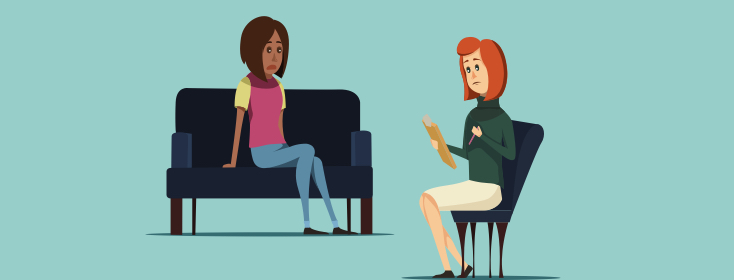How Seeing a Psychologist Helped My IBS
There have been moments when having IBS has caused me despair. So much so that I’ve been frightened of what might happen next. In fact, so frightened that it shocked me into making an appointment with my doctor so that I could be referred to a psychologist to get me back on track.
IBS may be a physical condition, but it affects you mentally too
For me, the trigger was thinking that I’d be feeling like this for the rest of my life. And, if my life was going to be like this, did I really want to live another 40 or 50 years feeling that way?
The answer to that question was “no.” I didn’t want to keep living and feeling like that every day.
And this wasn’t just a random thought for me either. It was something I was thinking about multiple times a day. I couldn’t block it out. But it was when I started thinking about it multiple times in an hour that I said enough was enough.
It was clear I couldn’t keep living like that. But I knew I wanted to keep living. I wasn’t ready to give up. There had to be a way out. Something had to change.
So I went to the doctor, cried throughout the first half of the consultation while explaining what was going on, and then asked what they thought I should do.
Since I was already on the low FODMAP diet, which was making massive headway on getting my symptoms under control, I was already doing the big things needed to help my IBS. But because I’d been suffering for so long, combined with a massive flare up I’d started experiencing almost a year earlier, my mental defenses had become so low that I couldn’t pull myself out of it even though my IBS was improving.
Mental challenges need mental help
My doctor, as lovely and supportive as she was, wasn’t equipped to help me in the way that I needed, so she referred me to a psychologist instead. I was given a list of some therapists that might be suitable and was told to look them up and see which one I thought would be the best fit for me.
In the end I chose one that worked very close to where I lived – I didn’t need a long drive to stop me from going – and who also specialized in anxiety, depression and chronic medical conditions. It’s the last point that was the deciding factor for me, because I knew my depression wasn’t caused by grief and my anxiety wasn’t caused by lack of confidence. Everything appeared to stem from the IBS and the steps I took to keep it under control and hide it from the world.
And then I got the help that I needed
It took about 4 weeks to get into this psychologist, which was a long time considering where I was at mentally. But there was something about knowing that I was already on the path to getting help that aided me during that wait and kept me going.
At first, we had weekly sessions, then fortnightly, then monthly, until I didn’t need them anymore and my IBS and my mental health were both stable. Removing the mental health challenges did help to remove the IBS trigger of stress and anxiety, but it also made me more capable of performing the other daily tasks I needed to avoid my triggers.
So please don’t ignore your mental state
If you’re struggling mentally, regardless of where your IBS is at physically, please do seek help. IBS is hard enough to deal with without having to deal with mental health challenges too.

Join the conversation